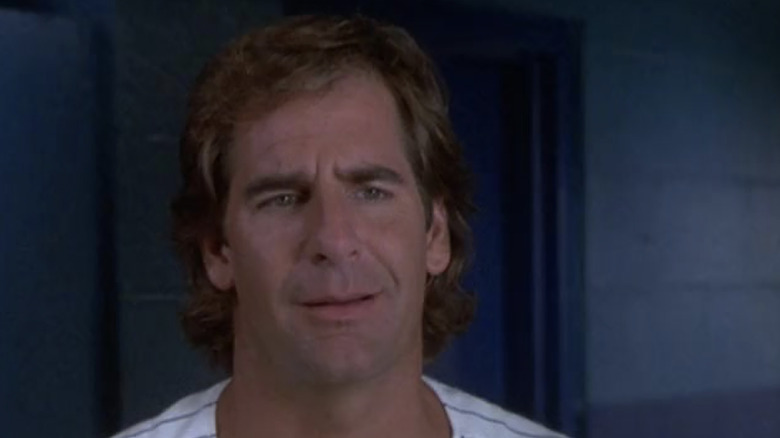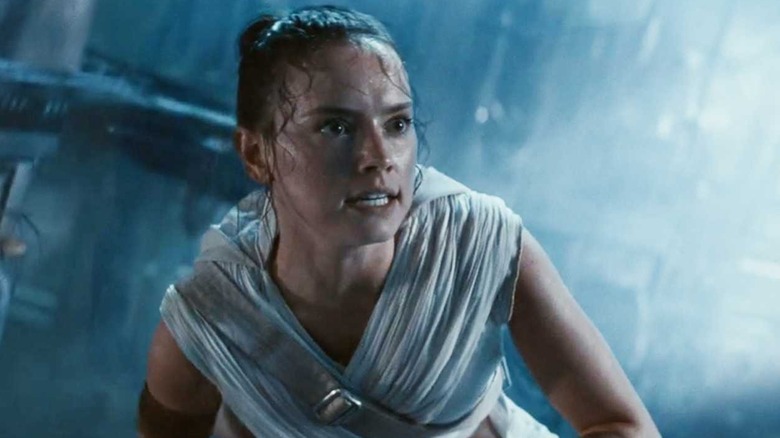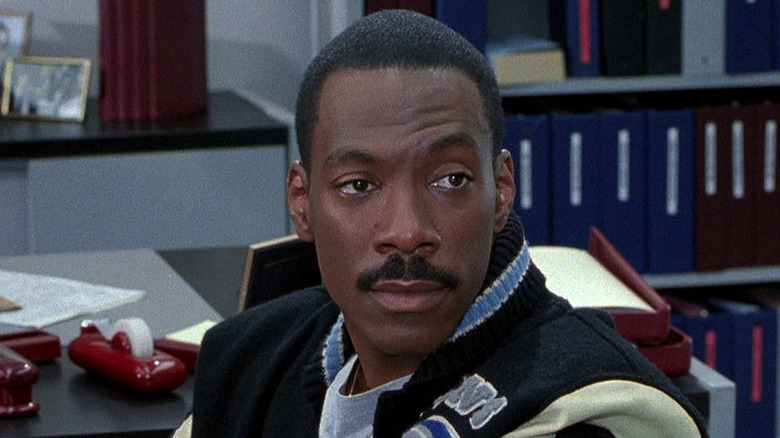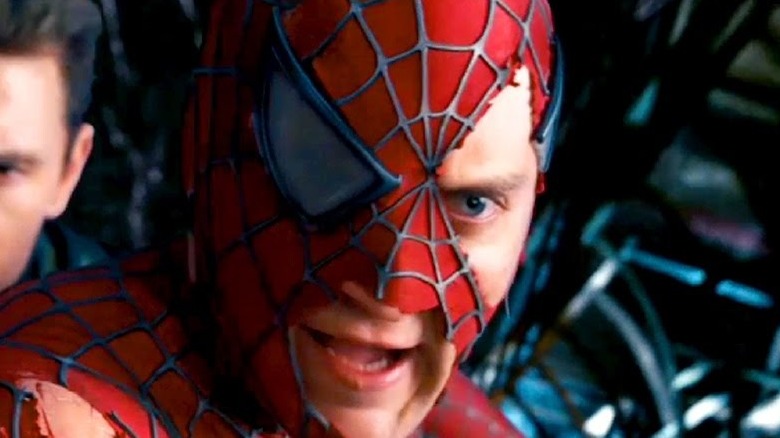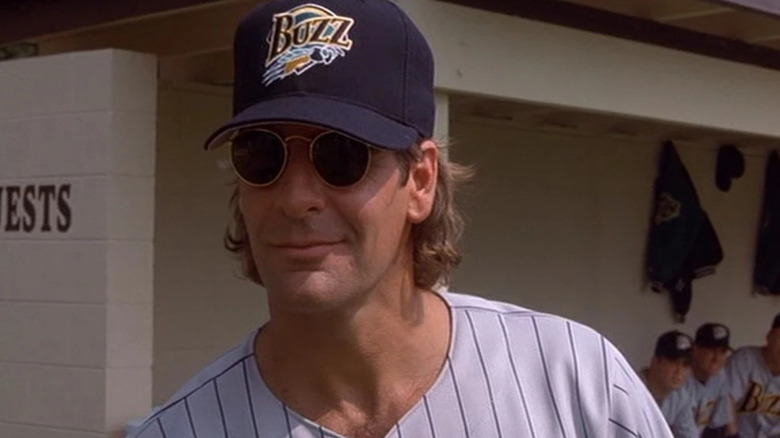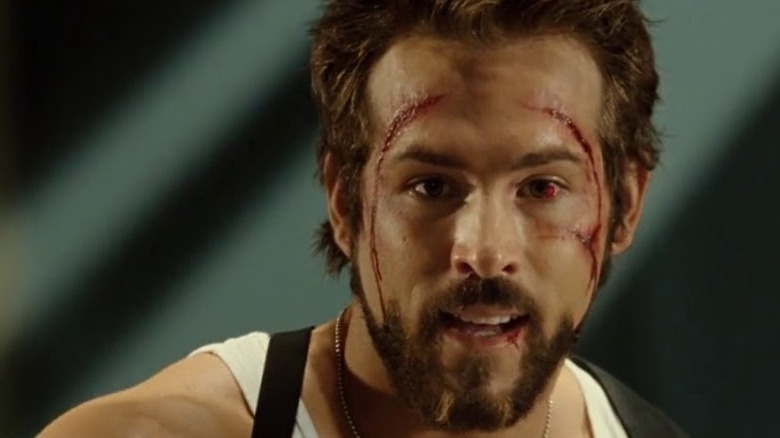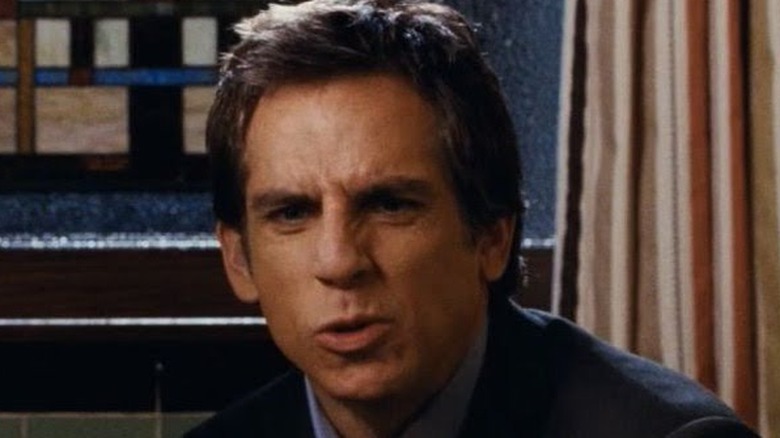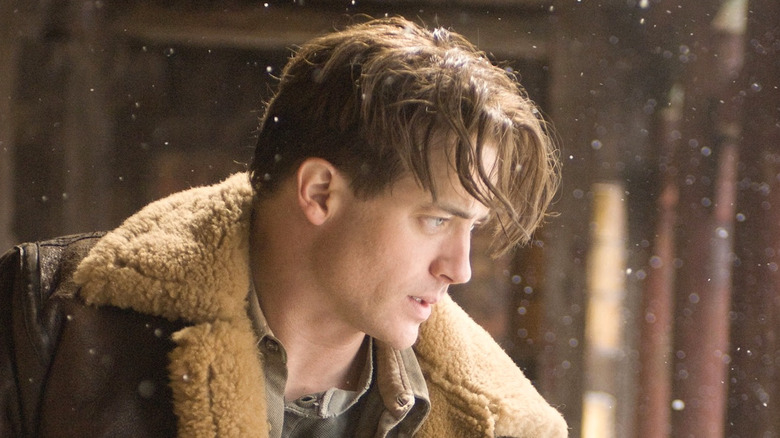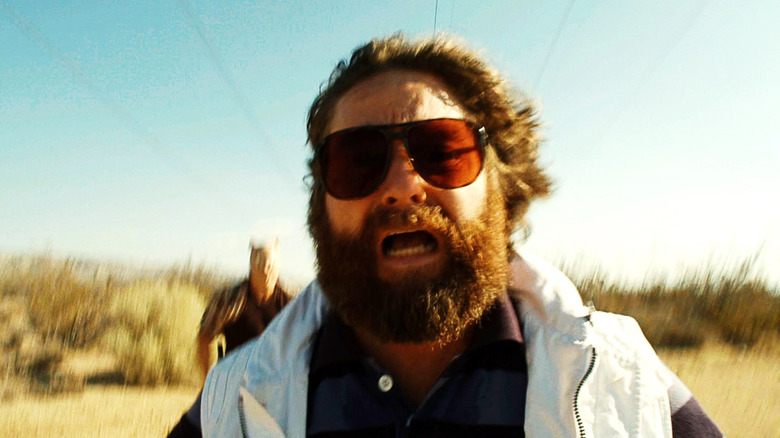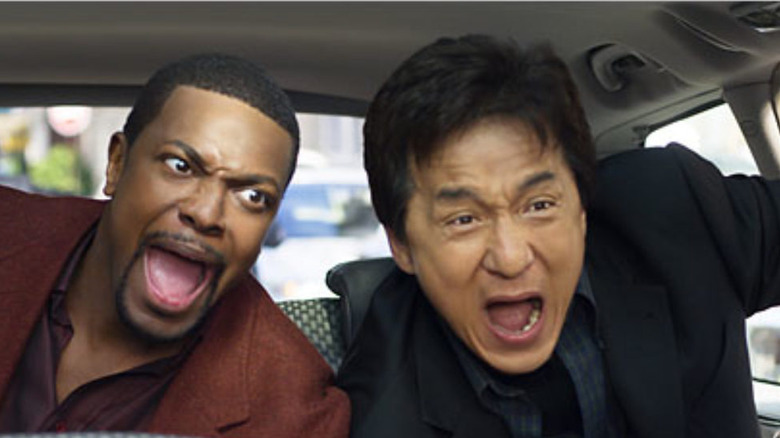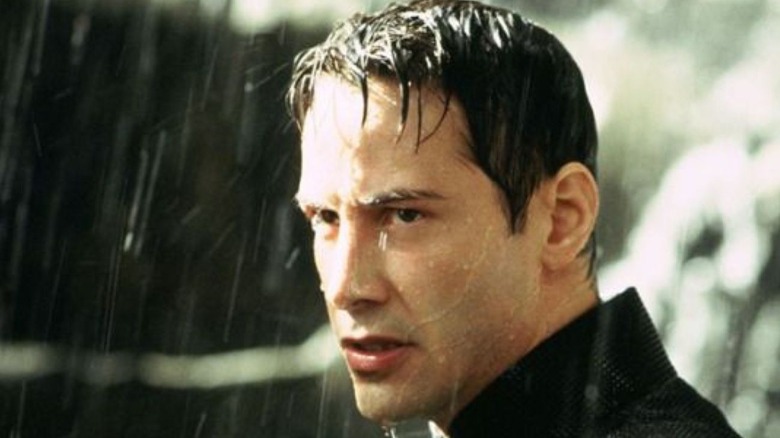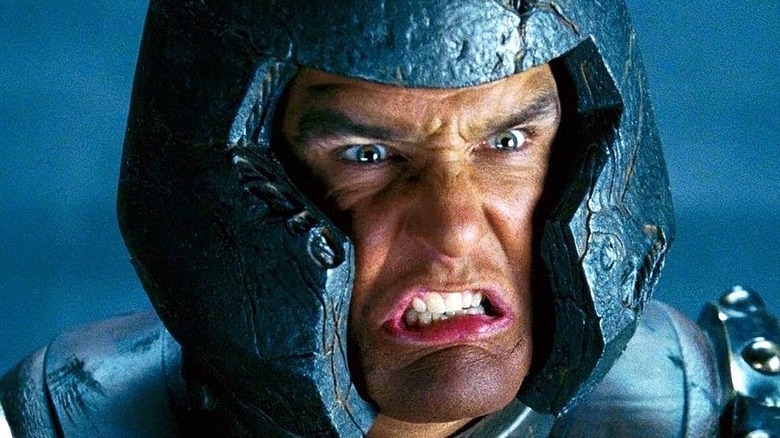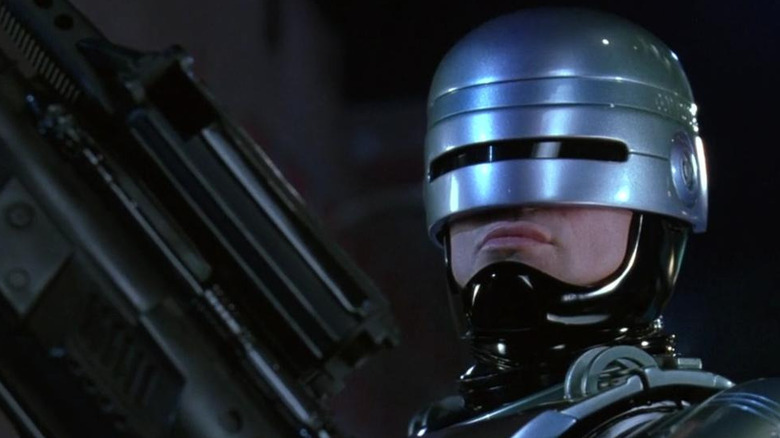Movies That Were A Sad Low End To A Trilogy
It's often said that a bad sequel can never truly diminish the quality of its predecessor — a great movie should stand on its own no matter how good or bad the follow-up may be. And that may be true to some extent, but when it comes to trilogies, an awful third film can suck a lot of the air out of the room. In some cases, where the second film was even better, it turns what could otherwise have been an absolute classic series into a letdown. In other cases, such as where the second film was a disappointment and the third couldn't redeem it, it makes a mockery of the first film's greatness. In the end, a bad third film, regardless of how good or bad the first two were, leaves audiences upset to think what could have been.
Over the years many trilogy enders have been revisited and scrutinized more with fresh eyes, like the much maligned "The Godfather Part III" that has seen renewed appreciation with a recent director's cut. But some third and final movie chapters have only gotten worse with age, and will forever be held as the disappointing, limp endings to their trilogies — sequels that took a good movie series and brought it to a sad, lowly conclusion.
We've sifted through the annals of film history, and put together a list of films that ended trilogies on the worst possible note.
Star Wars Episode IX: The Rise Of Skywalker
Despite what internet armchair critics might say, any failure of the new "Star Wars" trilogy is not the fault of woke politics or rehashed plots. The simple fact is that the producers did not plan out the three films to present a coherent story ahead of time, leaving J.J. Abrams to hurriedly cobble together a solution after the financial and critical disappointment that Disney felt from "The Last Jedi." "The Rise Of Skywalker" film was reportedly heavily cut up in editing, leaving it a jumbled mess of a story. It brushes over (and creates) massive plot holes in an attempt to course correct from the middle film in the trilogy, and even the cast themselves weren't thrilled with the movie they were making — and it shows.
Say what you will about the prequels, but most would agree that "The Revenge Of The Sith" was at least an improvement over the prior two films. And whatever you might think of "The Last Jedi," Riann Johnson, success or failure, at least managed to execute his own unique vision for "Star Wars." In contrast to both, "The Rise Of Skywalker" comes across as exactly what it is: a rushed mashup of committee thinking, the result of a dozen different producers' thoughts on how to "fix" the series, hoping to salvage the last gasp of the Skywalker saga and wring as much cash and merchandising out of the once king of franchises.
Thank the maker for "The Mandalorian."
Beverly Hills Cop III
"Beverly Hills Cop" is remembered even today as one of the greatest action comedies of all time. It grossed a whopping $316 million worldwide (about $621 million adjusted for inflation), and so a series of sequels was immediately drawn up. The first followup, "Beverly Hills Cop II" met with mixed reviews, but was nearly as big of a financial success as the first film, so of course Paramount wanted to plow ahead with a third installment. Murphy wasn't sold on the idea however, telling Rolling Stone in 1989, "There's no reason to do it. I don't need the money and it's not gonna break any new ground. ... The only reason to do a "Cop III" is to beat the bank, and Paramount ain't gonna write me no check as big as I want to do something like that. In fact, if I do a "Cop III," you can safely say, 'Ooh, he must have got a lot of money!'"
Well the studio apparently backed up the Brinks truck because Murphy returned in 1994 (his paycheck topped $15 million, per Entertainment Weekly). Unfortunately, what audiences were treated to was a movie that Empire wrote "manages to be at once boring and make no sense whatsoever. To put it mildly, utter tosh." Audiences were equally unimpressed, and the film flopped at the box office. Perhaps Paramount should have listened to Murphy before making him an offer he couldn't refuse.
Spider-Man 3
Sam Raimi's "Spider-Man" films (along with the early "X-Men" films, but we'll get to that later) heralded the modern comic book movie era. The first and second films, specifically, elevated the material to places that most previous adaptations of superhero comics had never been. They offered a mix of vibrant adventure and likable characters in stories that were not just fun and family friendly, but also took the often outlandish material seriously.
While the third film has its defenders, it also has plenty of detractors, most notably Raimi himself. During a 2014 appearance on the Nerdist podcast, he told host Chris Hardwick, "It's a movie that just didn't work very well. I tried to make it work, but I didn't really believe in all the characters, so that couldn't be hidden from people who loved Spider-Man." It didn't help that studio exec Avi Arad famously forced a third villain into the story to help sell toys.
What ended up in theaters was a diluted version of "Spider-Man" that stretched the story a bit too far. The film's vibrant fun and adventure sometimes devolved into self-parody, offering more silliness than it probably should have had. Overstuffed, it simply had too many plot threads and too many villains. The disappointment of the third film turned what could have been the greatest comic book superhero movie trilogy ever into an uneven saga that both Sony and Marvel were eager to reboot just a few short years later.
Major League: Back to the Minors
"Major League" was an irreverent, almost slapstick comedy, and a classic '80s misfit sports team movie. A perfect blend of "Bull Durham" and "The Bad News Bears," it was a madcap caper about a wayward baseball team that comes together to win the big game, with the added twist that their own management was betting against them. The sequel, which brought back stars Charlie Sheen, Corbin Bernsen, and Tom Berenger, was met with harsh reviews, with a Rotten Tomatoes score of 5% and a consensus that calls it a "lazy sequel."
When it came time for a third film in the series, Sheen and Berenger knew better and stayed far away, but Bernsen returned, with "Quantum Leap" star Scott Bakula in tow. We'd call it a "cash grab" but the previous film hadn't exactly been a big money maker. With a mostly new cast headlined by an out-of-work TV star and a stale premise, it lacked all the charm of the original, and as a second sequel, offered nothing new or unique. Instead of feeling like a blockbuster motion picture, it comes off more like a sad backdoor pilot to a TV series that never happened.
Blade: Trinity
The first "Blade" movie surprised audiences with its mix of action-adventure, supernatural horror, and Matrix-like visuals. It also proved that lesser known superhero characters could be successful on the big screen. The sequel, from visionary director Guillermo del Toro at the helm, built off the first film's success. It mixed in del Toro's signature sensibilities to the budding franchise's winning formula, and added the likes of Ron Perlman and Donnie Yen to the cast.
But it was all downhill from there. The third film, like many on this list, ended up as a watered down version of the first two, and was nothing short of an embarrassment. Filled with tired themes and overused story beats, plus a disinterested lead, the final product sparked a series of lawsuits between the studio and its star. Snipes' well-chronicled misbehavior on set, combined with his disgruntled attitude towards the franchise makes it at least somewhat of a fascinating watch, but definitely not an enjoyable one. Ryan Reynolds hamming it up as Hannibal King, a prototype for his Deadpool character in a lot of ways, is about the only thing worth paying attention to, as it seems like he knows he's in on the joke of a movie and is having fun with it. Seeing Jessica Biel attempt to become an action hero while Snipes effectively ends his own career with a lazy performance makes watching "Blade: Trinity" a decent party game, but decidedly not an entertaining movie experience.
Little Fockers
"Meet the Parents" was a huge surprise comedy hit for Ben Stiller in 2000, taking in over $300 million on a relatively modest $55 million budget. It earned positive reviews that praised the film's humor and heart, as well as its strong cast that included Robert DeNiro, Blythe Danner, and Owen Wilson. The sequel, "Meet the Fockers," was met with a lot less enthusiasm, but outdid its predecessor at the ticket counter, while adding Dustin Hoffman and Barbra Streisand to the series.
But even after the relatively cold reception to "Meet the Fockers," the second sequel, "Little Fockers" went ahead. The studio may not have any regrets since it almost equaled the first film's box office take, but it got an even worse response than the second film. Doubling down, the series added even more big names like Jessica Alba, Laura Dern, and Harvey Keitel, but that didn't make it any better. The film has the dubious honor of being nominated for three Razzies, with both Barbra Streisand and Jessica Alba dueling it out for Worst Supporting Actress (Alba would take home the trophy). The film is filled with so many childish sight gags and endless puerile potty humor, it feels like a movie aimed at toddlers. Running on empty by its third entry, not even a cast of Academy Award winners could save it.
The Mummy: Tomb Of The Dragon Emperor
It's odd to think this film was released the same summer as Marvel's first "Iron Man" movie, and DC's "The Dark Knight," because "The Mummy: Tomb of the Dragon Emperor" feels like a relic from a previous era of movies. Even the special effects looked woefully out of date, especially alongside those other modern classics. The film was absolutely savaged by critics, with Empire scoffing that it was "riddled with clunky exposition, wafer-thin characters and plot developments that should be a giddy, pulpy delight, but which instead feel cold and devoid of real inspiration." You might think audiences would have been more forgiving, willing to overlook its many flaws and enjoy it as a fun, light-hearted adventure flick, but movie-goers didn't feel much better about it. Holding just a 30% audience score from Rotten Tomatoes, it's proof that sometimes critics and audiences do agree.
Incredibly, "Tomb of the Dragon Emperor" wasn't the final film in the franchise — it was followed by an entire "Scorpion King" spinoff series based off the Dwayne Johnson 2002 "Mummy" prequel hit. These off-shoot films included five straight to home releases, with the most recent, "The Scorpion King: The Book Of Souls" arriving in 2018, a year after the disasterous Tom Cruise-led "Mummy" reboot.
Though "The Mummy: Tomb Of The Dragon Emperor" did manage to earn over $403 million worldwide, it is remembered more for being the movie that ruined Brendan Fraser's career than a triumphant trilogy capper.
The Hangover Part III
It's rare that a comedy earns massive box office bucks, but in 2009 "The Hangover" certainly did just that, while raising the bar for raunchy dark comedies at the same time. It's understandable that Warner Bros. would want to capitalize off its huge profit margins and give the audience more of what it seemed to really like. But the first sequel, "The Hangover Part II," disappointed fans and critics. Yet plans for a third film in the series were underway even before the release of "The Hangover Part II," which could account for some of the problems in the threequel.
Reviewers hated the movie, critical of its even darker tone, with Time calling it "aggressively nasty," in contrast to the simple black comedy of the first two movies in the series. Critics called out its rehashing of old ideas rather than trying something fresh with the brilliant cast, while Business Insider wrote that it was the "unfunniest of the trilogy." Even star Ed Helms seems to have acknowledged that "The Hangover Part III" was a bust, telling US Weekly that there was no chance of a fourth film because the series had "ran its course."
Rush Hour 3
The cross-cultural buddy cop comedy series "Rush Hour" was built off of the dual wits of Asian import and action star Jackie Chan — who was a relatively unknown in America prior to the film's 1998 release — and comedy newcomer Chris Tucker. Like any good odd couple, it was their differences both in style and culture that made the comedic duo work. The "Rush Hour" movies don't do anything all that fresh or new, but offer up what action comedies do best: get their heroes into sticky situations they have to squeeze out of, while cracking jokes along the way.
But that was part of the problem: We had seen it before, and by "Rush Hour 3" the cast and crew were on well-trodden ground. The "Lethal Weapon" series managed to thrive because of a brilliant director, and an ensemble cast that grew with each movie. "Rush Hour 3" however, succumbed to the same fate as many of the films on this list, with nothing to say that hadn't already been said, and said better, by its predecessors. It didn't help that it was a "culture clash" film — by a tone-deaf director — whose premise was predicated on poking fun at ethnic stereotypes, which by 2007 had become something of an outdated sub-genre.
The film was widely panned, and holds just an 18% on Rotten Tomatoes. It was the last we saw of this once dynamic duo, though there may a "Rush Hour 4" sometime in the near future.
The Matrix Revolutions
Perhaps "The Matrix Redemption" would be a better title for the upcoming relaunch of "The Matrix" trilogy, because we're hoping the new film will redeem the utter mess that was given to us in 2003's "The Matrix Revolutions." The third film was an underwhelming final bow for the original trilogy. The Wachowski's overpromised and spectacularly underdelivered, with dull action sequences and neutered villains that had seemed so terrifying in the earlier films. Overloaded with expository philosophy and religious symbolism that would have been better served as subtle allegory, the film, put succinctly, was a flaccid conclusion that hobbled to the finish line.
Warner Bros. choice to film "Revolutions" back-to-back with "The Matrix Reloaded" may have seemed like a shrewd cost-saving measure at the time, but the decision was ultimately part of its downfall. Working on them at the same time prevented the filmmakers from refocusing and fixing issues that audiences had with the first sequel, something that successful trilogies like "Indiana Jones" or even the "Star Wars" prequels had been smart to do. Releasing both in the same year was an even worse decision, as movie-goers had soured after "Reloaded" and weren't ready to head right back to theaters barely six months later.
What it all boils down to is put best in a review from Rolling Stone, which bluntly opens with "'The Matrix Revolutions' sucks."
X-Men: The Last Stand
The drop from "X2: X-Men United" to "The Last Stand" is precipitous, with incoming director Brett Ratner (replacing Bryan Singer) even managing to turn Wolverine and Magneto — two of the best comic book characters ever put to screen, played by award-winning actors in their most defining roles — into walking jokes. Several limply executed new characters like Beast and Bolivar Trask would eventually return in other, better movies making this entry all the more embarrassing. Juggernaut too would get a second chance in the comedy "Deadpool 2," but he is still unintentionally funnier in "X3" than he is in the Ryan Reynolds sequel.
"X-Men 3: The Last Stand" was such a bizarre, ineffectual take on the material that future X-films weren't even shy about both pretending it never happened (see: "X-Men: First Class") and retconning it out of existence, which is what happened with the conclusion of "Days of Future Past." They even managed to poke fun at how notorious terrible it was with a meta joke in "X-Men: Apocalypse" where Cyclops points out that "everyone knows that the third movie is always the worst."
Though it uses the exact same cast as the previous films, and even adds a few new talented faces like Kelsey Grammar, Elliot Page, and Ken Leung, it feels like a film from an entirely different universe. Even a cameo by R. Lee Ermey can't save this farce of a threequel.
Robocop 3
There's no beating around the bush here: "Robocop 3" took one of the best, most beloved '80s action films, and spat out a watered-down, nonsensical mess of haphazard schlock. After the disappointing "Robocop 2," the third film had the chance to redeem the trilogy, but instead fell flat on its face. Empire said it best: "For what was a promising debut, ['Robocop's'] reputation was quickly tarnished with the drivel such as this that followed."
It's hard to even put into words how low this threequel sank and how pathetic it truly is in comparison to its towering first entry (so low that even original Robocop Peter Weller refused to return). The film lacks all of the intensity, unrelenting violence, and political allegory that made "Robocop" a hit and instead devolved into a cartoonish farce.
The film actually boasts an interesting starting premise (evil corporation attempts to buy the entire city of Detroit), but completely undercuts it by regressing to old tropes and kid-friendly gimmicks. What's more, director Frank Dekker had the impossible task of somehow recapturing the magic of the classic first film within the confines of a PG-13 rating. Ultimately what we got came across more like one of the "Robocop" copycats introduced by OCP in the original movie: a weak, ineffective, ugly imitation of the real thing, that barely got off the ground before collapsing under its own weight and being put out of its misery.
